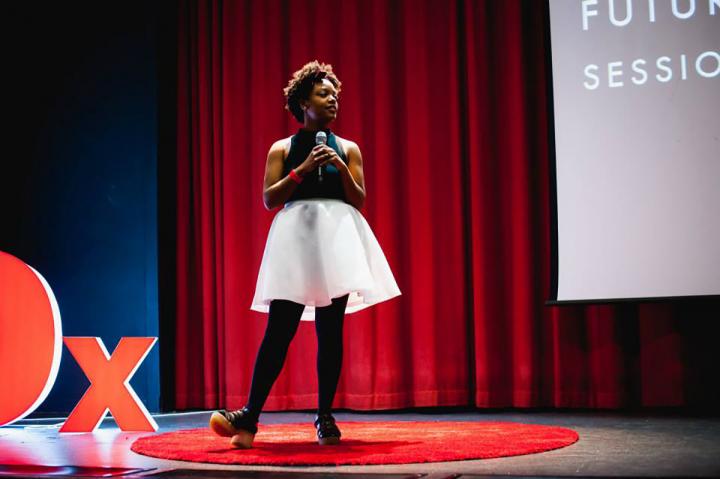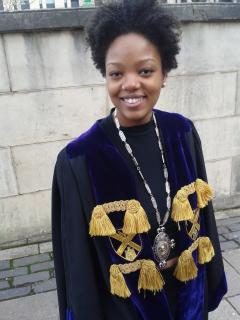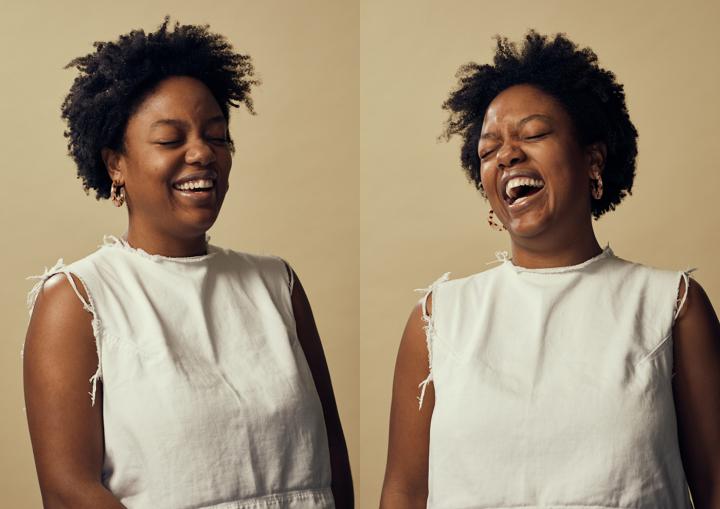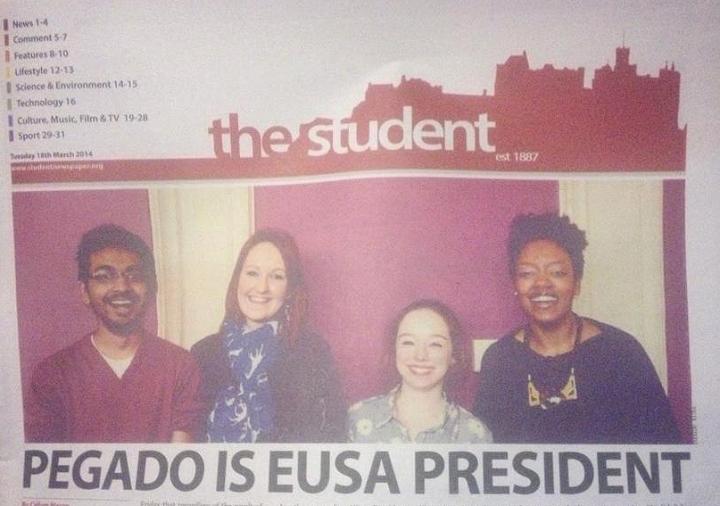“I always stood up for what’s right.”
Briana Pegado talks about being the first black female President of the Edinburgh University Students’ Association, being both creative and politically active from an early age, and the challenges that young people face today.

You came to study in Edinburgh from the US. What drew you here?
This is a huge question, what didn’t bring me here might be better. Well, I would say it was a number of things – the incredible reputation of the University for what I originally came to Edinburgh to study, International Relations, and the even more renowned reputation of J K Rowling’s Harry Potter. I was a child born of the Harry Potter generation after all.
My parents actually met and later got married in London in 1984, so I had visited our fair island before. I grew up with my dad talking about his fond memories of the UK and when I visited when I was 10 I fell in love.
Obviously, Edinburgh is no London and when it came to deciding on where I would pursue my studies, the English higher education system was too rigid for me. The thought of studying one subject for three years and nothing else felt too confining for the liberal arts education I had been raised to pursue.
I applied to Edinburgh and St Andrews along with Trinity, the American University of Paris, and two universities in Canada including McGill University. When I was accepted by Edinburgh with a conditional offer in the Fall, I took a huge risk of turning down all my other acceptances to risk getting the right mark to be moved on to a conditional offer.
How did your time studying here influence your career path?
I arrived at Edinburgh to study an MA in International Relations knowing I had a love for travel, politics, geography, languages, religion, cultures and understanding other people. It was so difficult to whittle my choice down to one degree subject and though I took outside courses in religion at New College, got involved in student politics and stayed involved in the arts I still found things difficult, especially because I knew my main passion was saving the planet. I had been accepted to St Andrews to read Sustainable Development, but I knew Edinburgh was the right university for me.
Then in my second year, I was told that the School of Social & Political Science was introducing a new degree, MA Sustainable Development. I would be part of the first ever cohort in the University’s history if I decided to change my degree. It was an easy decision for me that I jumped at, but I took a lot of time considering my options, including what this might do to my future career path and how my degree might be accepted internationally.
This degree fundamentally influenced my career path in the sense that it is the lens with which I see the world from the perspective of new ways of working, innovative ways society can be structured, new technologies and approaches to our lives that do not harm the planet. Looking at my career path now, this sustainable development influence may not be apparent, but if you look a bit deeper you can see I have brought together the private, public and third sector in my work within the creative industries in a way that sustainability is at the core.

You were the first black female President of the University’s Students’ Association. How did this make you feel?
My experience of racism and structural racism has been very shaped by my incredibly privileged experience growing up. I would say that sexism and misogyny is something I experienced at a much earlier age because I was always the only girl on the all-boys tackle football team in eighth grade or dressing like a goth in an all-girl punk rock band in a music industry that was incredibly male dominated.
At Edinburgh I was an international student and often felt grouped in this category in a way that allowed me to lead with that before my race. However, as I got older that changed.
Becoming the first black woman President of the Edinburgh University Students’ Association was tremendous. But what was more tremendous was the campaign I ran with a group of committed people that believed in me and the change I wanted to bring to student politics, a union that was more focused on students’ needs driven by consensus rather than national politics. Austerity was having a massively negative impact on higher education and the politics of the day on how welcome international students were in the UK.
That role changed me. It was very challenging as I experienced very subtle racism for the first time in my life. A covert kind, that looked like terrible joke articles being written about me by the student press or none at all when our Sabbatical team had accomplished something massive, like getting ERASMUS payments secured when there was funding issue where students were stranded on their year abroad. I look back on this time now as a massive accomplishment, but I certainly had a lot to learn.
The role is a platform to help improve the student experience. Tell us about how you used this platform, the highlights of your role and the legacy you left.
I feel my biggest legacy as Students’ Association President was ushering in a period afterwards of better representation of students across the University, not just the politically engaged, and more democratic ways of engaging students including our first ever strategic planning process consulting students as a students’ association. There are now more Sabbatical Officers than there were before which means better representation.
Our year was pivotal for restoring an incredibly fraught relationship with the University, which took a lot of work completed by the President that preceded me and the President that succeeded me. I may have also been the first international student President (I am not sure of this) and I was happy that international students were being better represented by the union, which reflected the change in demographics at the University.
What issues are important to you and how do you think activism can change the world for the better?
‘The personal is political’ is a phrase that has been attributed to the likes of Angela Davis and Gloria Steinem; whomever said it first, the phrase is also inherently true. Activism requires action and though I haven’t always identified as an activist I have always been incredibly active standing up for and fighting for what I believe in. Whether it was my first to play tackle football as the only girl on the boys team at school or fighting for the privilege of studying outside of the United States.
I was raised in a family that was incredibly politically active. My mother was Assistant Secretary and Foreign Director General of the Department of Commerce under Bill Clinton. My grandmother was an English teacher in the Montgomery County (Moco) Public School system in Maryland and always stood up for what she believed in. Even if it was to complain about an invasive species ruining her back garden coming from vacant property owned by the city council.
I protested at a young age. I got involved in politics and I always stood up for what was right. That is what I was explicitly or implicitly encouraged to do at all times. To always serve others through whatever means possible and always remember to walk in others’ shoes. The issues that are most important to me are saving the planet, ending violence against women and girls (which I have unfortunately experienced), fighting growing inequality in our society, and a society which promotes good mental health for everyone.

You founded the Edinburgh Students’ Arts Festival, became a Fellow of the Royal Society of Arts and are now Director of Creative Scotland (Edinburgh). Where does your passion for the arts come from?
My passion for the arts comes from my very creative and weird inner life. It comes from attending Montessori School from the ages of two to five. It also comes from an incredibly creative family that valued the arts. My mother was a ballet dancer for much of her life. My father was great at drawing and studied architecture at one point in his life. My grandfather was an amateur thespian who performed in community theatre and volunteered for recording for the blind and dyslexic.
I was encouraged to be creative from a very young age and danced intensively all forms including ballet, tap, hip hop, modern dance and jazz. I performed drama and expressed myself creatively at school through painting and photography. I played rhythm guitar in a band for seven years and wrote a lot of the music. I realise what a privileged existence I had as a young person. I had all the lessons and all the materials for my creative life.
I remember when I was little establishing a local neighbourhood newspaper, which I wrote and distributed for the entirety of one summer, as well as the short-lived film career I had with a camcorder I got as a birthday gift. I understand the value of the arts because I saw it at work in my everyday life. I saw the importance of it being embedded into our existence as human beings and the care it allows us to show others who are vulnerable.
You’ve kept up a connection with the University, and spent some time as member of the General Council Business Committee. Tell us about your role on the committee and why the General Council is important to you.
I joined the General Council Business Committee in 2015 off the back of my year as Students’ Association President. The Students’ Association President at the time and my ex encouraged me to do it. We both saw the value of a young alumna’s voice being part of the conversation to hold the University to account and make sure alumni’s interests were served by the University. My year as Students’ Association President really helped me understand the governance of the University and it lends itself to the General Council Business Committee well.
The General Council is incredibly important because of the structured way the Business Committee can truly interrogate the University’s decision making and help inform the future of the University. It is also an honour to be elected and to be able to volunteer my time in this way. After a year, working full time as a Sabbatical Officer one experiences withdrawal. This is a good way to ease oneself out of the process of serving the interests of the University student community.

You were listed in YWCA Scotland’s 30 under 30 inspiring women 2017. What inspires and drives you?
Honestly? The incredible community of creative people and initiatives in this incredible country that I know will serve the world. Scotland had its first Enlightenment in the 18th century, but another one is taking place in the form of data-driven technologies, purpose-driven businesses that consider people and planet over profit, and one of the fastest growing creative industries in the world.
To bring things full circle, the reason why I work in the creative industries is because I believe it is creative minds willing to break the mould, think outside of the box, consider possibilities that are radical, and really challenge us to question society that will steer us towards a more sustainable future. Being alive in this day and age even with its challenges is the most incredible gift I could have been given. I am just happy that I can play a role in supporting others to realise their full potential and experience the incredible innovations that are coming out of our mighty country at this pivotal moment in history.
What are the biggest challenges facing young people in daily life today and how do you think these can be overcome?
Young people are constantly underestimated and often, not always but often, burdened with the criticisms of generations that project their failings onto those that come after them. Without putting it lightly, we have inherited a world in crisis. There is no beating around the bush about it.
We have diminishing resources, growing inequalities, and challenges that no other generation has ever had to face. We are tasked with protecting the existence of our species as we know it. We are also alive at a time when there has never been so much wealth, health and so many resources available to us at our disposal. It is a paradox of epic proportions.
I believe the biggest challenge we face is confidence. We have what it takes to positively change the world; we simply need to believe it. I have total confidence in young people to face the challenges to come, but I worry about growing mental ill health and the economic crises we have faced unlike any other generation before us. It will take ingenuity, inventiveness and aplomb to pull it off, but I know that we can do it. And we need to, for once, not listen to those that doubt us based on our age. As we see from the state the world is in, age does not equal wisdom.
Many young people feel anxious in these challenging times. What are your coping strategies for keeping calm in a crisis? What advice would you give to others?
Focus on what you can change and focus on what you can control. Nothing in life is permanent, even life, so things will change. They have to. Whether or not it is for the better or worse. It is important to stay grounded and focus on the present moment in any way you can.
Whether that means minimising news consumption, focusing on activities that take your mind off of things, using your breathing, putting a plan in place for short term goals, and letting yourself off the hook of the idea you need to constantly be productive. This is a trap embedded in us by the capitalist society we live in and, guess what, it is not the truth. You do not have to earn your right to be alive. That is a given.
I find practising gratitude for what I have to be incredibly helpful and where things look bleak on that front, I would encourage you to be compassionate with yourself. If all you do today is get yourself out of bed, honestly, you’ve won.
What motto do you live by?
The universe tends to unfold as it should and never forget your childish enthusiasm. Also, “Never doubt that a small group of thoughtful, committed citizens can change the world; indeed, it is the only thing that ever has.” Margaret Mead.
Find out more
Read more Edit supplements
Find out more about the General Council and the Students' Association.
Photographs courtesy of Matt Beech Photography, Mihaela Bodlovic and Briana Pegado.

